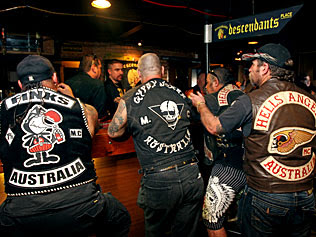For More Information Visit Creator Forum Topic:
The Australian National Anti-Gang/Anti-White Taskforce
By Colin James – MSM Legal Affairs Editor
The Adelaide Advertiser (South Australia) | 18 June 2008
http://www.news.com.au/adelaidenow/story/0,22606,23883992-2682,00.html
GYPSY Jokers from across Australia have gathered in Adelaide for a funeral which would be illegal under new anti-bikie laws introduced by the State Government.

The bikies were farewelling club president Wayne “Chiller” McGrath, 42, a father of four and part-owner of four tattoo parlours, who suffered a fatal heart attack last week while exercising on a treadmill at his Virginia home.
His sudden death prompted public tributes from Gypsy Jokers members nationally and overseas, including the US, Germany, South Africa and Norway.
More than 300 people – including more than 100 Gypsy Jokers from Adelaide, NSW, Victoria, Queensland, Western Australia, Germany, Norway and the US – this afternoon attended his funeral at Sydney Harrison Funerals, Ridgehaven, before travelling to the Smithfield Memorial Cemetery, Evanston, where his body was buried.
The mourners – who included wives, girlfriends and children – then went to the Gypsy Jokers clubrooms at Wingfield for a wake expected to last most of the week.
Legal sources said under the new anti-bikie laws due to take effect late next month, the funeral and wake would have been declared prohibited events as bikies will be prohibited from associating with each other once their gangs have been declared illegal organisations by Attorney-General Michael Atkinson.
The laws – the first of their kind in Australia apart from the federal anti-terror legislation – have been attacked by lawyers and civil liberatarians as “draconian” and an erosion of individual rights, particularly freedom of association.
Gypsy Jokers Adelaide chapter sergeant-at-arms “Davo” today ...
Read More
said it was wrong that bikies would no longer be able to gather together at such events as funerals, weddings and birthday parties with their families and friends.
“They’re f…..d,” he said.
“How can something like a funeral be illegal? We’re here to bury our brother and pay our respects to him and his family.”
Davo, who would not provide his full name, said Mr McGrath was a “staunch member, a dedicated family man”.
“He leaves a big hole and he will be missed,” he said.
The laws contain provisions that members of outlaw motorcycle clubs can only associate with direct family members such as their parents, brothers and sisters, grandparents and children.
They are not permitted to gather together or have contact with their uncles, aunties or cousins – or neighbours and other friends or acquaintances.
Anyone who breaches the laws – whether they are bikies or individuals having contact with bikies at least six times a year – can be jailed for up to five years.
Control orders restraining the movements of individual bikies can also be issued by magistrates and judges on the application of SA Police.
Criminal intelligence used by police to obtain the control orders must be classified as such by the Police Commissioner and can be withheld from certain parties in court. “Criminal intelligence” is defined as information that will prejudice a criminal investigation.
All other information used when applying for a control order and not classified “criminal intelligence” must be presented in accordance with standard court rules.
There are several points at which appeal action can be taken by a person who is the subject of a control order. Courts must be satisfied that the subject is either a member of an outlawed group, an associate of such a group or is conducting other serious criminal activity before granting a control order.
Once an order is issued, the subject has 14 days to lodge an objection with the court which will be heard by a judge who will consider if there are sufficient grounds for the orders.
If the subject is still unsatisfied, they can go straight to the Supreme Court on a question of law or seek leave to appeal to the Supreme Court on a question of fact.
In addition, at any time the court can vary or revoke an order. Either the Police Commissioner can apply to the court at any time or the subject of an order must apply for leave to be heard on the revokation or variation.
Section 41 of the Act also states that, other than the provisions outlined above, there is no other right of judicial review in relation to control orders.



